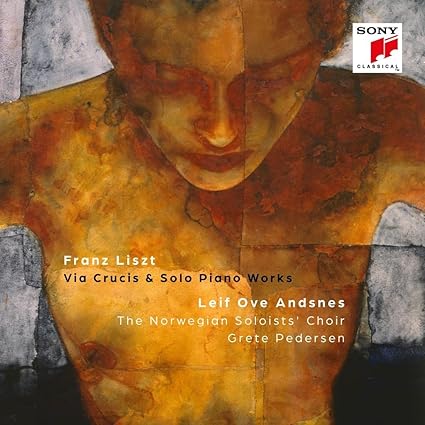

Via Crucis (The 14 Stations of the Cross), S 53 Consolations (Six pensées poétiques), S 172 Harmonies poétiques et religieuses, S 173
When one thinks of Franz Liszt (1811-1886), the ubiquitous image that comes to mind is of a flamboyant, iconoclastic piano virtuoso with a razzle-dazzle stage presence. Sort of like a 19th century conception of a rock star. After all he was a composer who declared war against the pseudo-romantic academisism of other composers like Mendelssohn for example. He discovered and exploited the orchestral possibilities of the piano. But as he aged, he pursued a new type of 'humanistic music' that could unite the dramatic element of the theater with the devotional spirit of the church. He gradually moved toward the Christian religious ideal. In fact, when he was still in his twenties, he asked for a renewed church music that could lead people back to an observance of the divine service. He became more and more concerned with the spiritual revelations to be found in the harmonic intricacies of music rather than its dramatic power. I would even go so far as to say that in his late piano works like Nuages Gris to name but one example, he was one of the first to explore atonality and even delve into serial music techniques.
Via Crucis dates from 1876-79 and was set for different combinations including organ and choir, harmonium and choir, piano four-hands and choir, and solo piano and choir which is the version performed in this recording. It's an odd work, stripped down to the most simple and basic utterance, yet at times harmonically intricate and at times harmonically pure, and always highly expressive. From pain and anger when Jesus falls, to pure love and regret when he meets his mother. Leif Ove Andsnes digs deep to bring the crucial aspects of this work to the surface. And the Norwegian Soloists' Choir, as in the passage when Jesus dies on the cross, always convey sorrow with the utmost innocence and sincerity.
As for the well-known Consolations, especially the famous No. 3 in D-flat major (Lento placido), Andsnes' unaffected interpretation truly captures and projects the essence of Liszt within its alluring beauty.
This recording may very well alter your perception of Franz Liszt from a vain showman to a consummate and refined musician and composer.
Jean-Yves Duperron - April 2025 Jesus falls for the third time